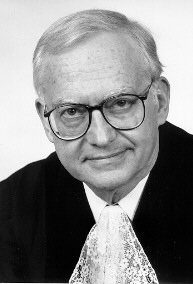Stephen M. Schwebel
|
His Excellency Stephen M. Schwebel |
|
|---|---|
 |
|
| President of the International Court of Justice | |
|
In office 1997–2000 |
|
| Preceded by | Mohammed Bedjaoui |
| Succeeded by | Gilbert Guillaume |
| Vice President of the International Court of Justice | |
|
In office 1994–1997 |
|
| Preceded by | Shigeru Oda |
| Succeeded by | Christopher Weeramantry |
| Judge of the International Court of Justice | |
|
In office 1981–2000 |
|
| Preceded by | Richard R. Baxter |
| Succeeded by | Thomas Buergenthal |
| Personal details | |
| Born |
March 10, 1929 New York, New York City; U.S. |
| Nationality |
|
| Alma mater |
|
Stephen Myron Schwebel is an American jurist, counsel and independent arbitrator. He serves as President of the World Bank Administrative Tribunal and as a member of the U.S. national group at the Permanent Court of Arbitration. Previously, he served as President of the International Monetary Fund Administrative Tribunal (1994–2010), as President of the International Court of Justice (1997–2000), as Vice President of the International Court of Justice (1994–1997) and as Judge of the International Court of Justice (1981–2000). Prior to his tenure on the World Court, Judge Schwebel served as Deputy Legal Adviser to the U.S. Department of State (1974–1981) and as Assistant Legal Adviser to the U.S. Dept. of State (1961–1967). He has also served as a professor of law at Harvard Law School (1959–1961) and Johns Hopkins University (1967–1981). Judge Schwebel is noted for his expansive opinions in momentous cases such as Legality of the Threat or Use of Nuclear Weapons,Military and Paramilitary Activities in and Against Nicaragua and Oil Platforms (Islamic Republic of Iran v. United States of America).
Stephen M. Schwebel was born on March 10, 1929 in New York City and while attending high school in New York City developed a strong interest in the United Nations Conference on International Organization being held in San Francisco. The U.N. Conference and the U.N. student organization that he was active in (and that was later affiliated with the United Nations Association of the United States of America), marked the start of a long focus on international relations and law. After entering Harvard University, he became active in the U.N. student movement and participated in founding The United Nations Council of Harvard. In 1950 he received a B.A. magna cum laude with highest honors in government from Harvard and was awarded the Frank Knox Memorial Fellowship. The Knox Fellowship enabled Schwebel to perform research and study in a Commonwealth country of his choice. Schwebel chose to study international law at Cambridge University in England under Sir Hersch Lauterpacht who advised him, upon completion of his year at Cambridge, to attend law school. He subsequently entered Yale Law School where he received an LL.B. (1954). While studying at Yale, Schwebel was told by the eminent professor of law Myres McDougal that in order to become an influential international lawyer he first needed to, "earn his spurs," at the best law firm that would take him. From 1954 to 1959, Schwebel practiced law as an associate at the law firm of White & Case in New York City. While at White & Case, he had the opportunity to participate in one of the largest international arbitration cases of the 20th century - Saudi Arabia v. Arabian American Oil Company. Schwebel was assigned the, "digging," on the case and spent countless hours going through files; however, the experience engendered a lifelong interest in international arbitration. In 1959, he accepted a position as Assistant Professor of Law at Harvard Law School where he taught until 1961. In 1961 Schwebel started his career with the U.S. State Department as Assistant Legal Adviser on United Nations Affairs. In 1967 he returned to academia as the Burling Professor of International Law at Johns Hopkins School of Advanced International Studies.
...
Wikipedia
